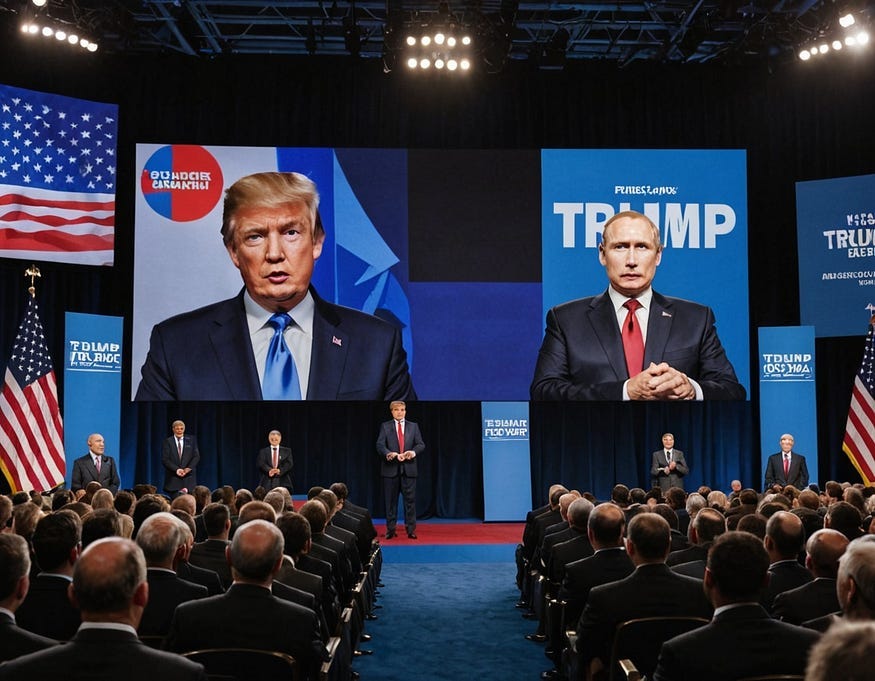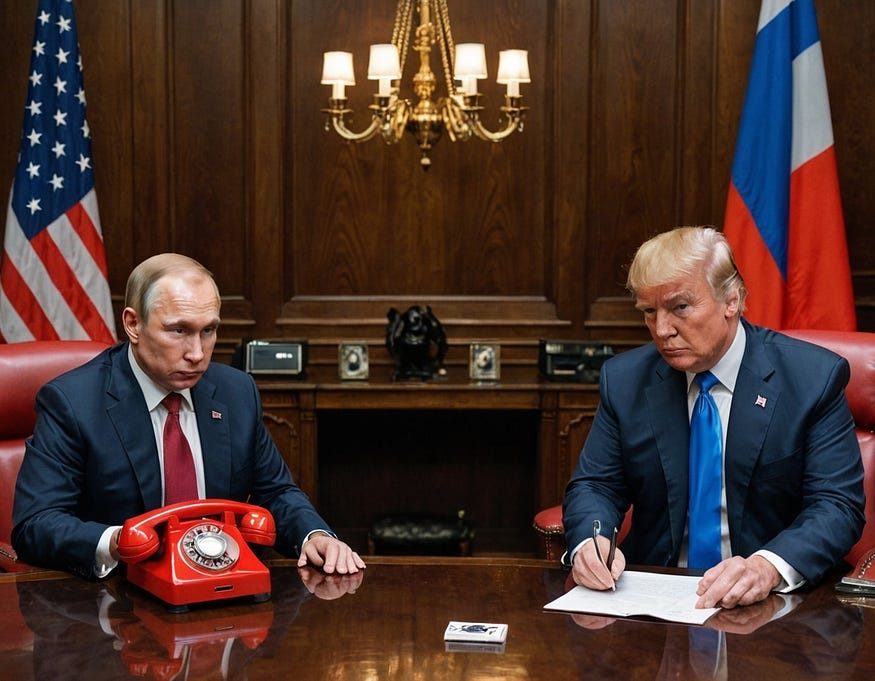Are Trump and Putin Collaborating to Sway World Opinion? The Strategic Alliance Against America Theory
Are Trump and Putin aligning their strategies to sway global opinion and position Trump as the leader who can prevent nuclear war?
As global tensions continue to rise, a provocative theory is gaining traction: the possibility that former U.S. President Donald Trump and Russian President Vladimir Putin may be working together to influence world opinion in favor of Trump’s return to the presidency in 2024. Some argue that this collaboration could aim to position Trump as the leader who can prevent a nuclear conflict between Russia and the West. While there is no direct evidence of a formal alliance, a series of recent events and statements by both leaders have led to speculation that they may be aligned in their interests — possibly even engaging in a coordinated strategy that resembles Russia’s traditional “Active Measures.”
Trump and Putin: Leveraging the Nuclear Threat for Strategic Gain
Both Trump and Putin have recently emphasized the potential dangers of nuclear conflict in their rhetoric. This alignment raises questions about whether the two leaders are strategically using this heightened fear to manipulate public opinion. Trump, by playing up the threat of a nuclear war, positions himself as the only leader who can negotiate peace with Putin and de-escalate the situation. At the same time, Putin’s warnings about nuclear escalation appear designed to encourage Western voters to support a leader like Trump, who he perceives as more likely to be conciliatory toward Russia.
If allowed to continue unchecked by both parties, this alignment could suggest a deeper level of collaboration. Putin likely knows that leaders like Joe Biden, Kamala Harris, or any other American patriotic president would respond decisively to any real threat, without the need for idle rhetoric. Therefore, Putin’s apparent comfort with Trump’s nuclear threats may imply that he trusts Trump to act in his favor, not against him.
Why Would Trump and Putin Collaborate?
Trump’s Return to Power as a Strategic Goal for Russia:
Putin has long been perceived as favoring Trump over other U.S. leaders. During Trump’s presidency, U.S.-Russia relations were relatively stable, and Putin benefited from Trump’s criticisms of NATO, skepticism towards traditional U.S. alliances, and his desire for closer ties with Moscow. A Trump presidency could mean a softer stance from the U.S. on Russia’s actions in Ukraine and decreased Western military support for Ukraine.Avoiding Nuclear War as a Shared Objective:
Both leaders have recently leveraged the fear of nuclear conflict to their advantage. Trump has repeatedly warned of the risk of “World War III” and urged Americans to “pray” following Putin’s announcement to move nuclear weapons to Belarus. This rhetoric aligns with Putin’s claims that Western involvement in Ukraine could lead to nuclear escalation. By presenting himself as the only leader who can manage relations with Putin, Trump could gain support from voters who prioritize peace and stability.
Evidence of a Possible Collaboration
Trump’s Public Statements:
Since leaving office, Trump has continually criticized the Biden administration’s handling of the Russia-Ukraine conflict, suggesting it would not have occurred had he been president. He has portrayed himself as uniquely capable of managing relations with Putin, using his calls for prayer and accusations against the current government as evidence that he is the leader who can de-escalate tensions.Putin’s Nuclear Posturing:
Putin’s announcement to station nuclear weapons in Belarus, paired with his claim that this is “not a bluff,” seems calculated to create a climate of fear in the West. This strategy could encourage voters to support a leader like Trump, who is perceived as more willing to negotiate with Russia. By stoking fears of nuclear conflict, Putin indirectly bolsters Trump’s narrative that he alone can prevent such an outcome.The Role of Disinformation and Propaganda:
Disinformation campaigns have been pivotal tools in modern geopolitics, and Russia is known for influencing foreign elections and public opinion through cyber activities and social media manipulation. If a collaboration exists, Russian state-run media could amplify messages portraying Trump as the best candidate to achieve peace and stability, indirectly promoting his return to power.
Potential Benefits for Both Leaders
For Putin: A Trump presidency could mean less robust U.S. support for Ukraine, a weakened NATO, and possibly lifted sanctions against Russia. Putin could expect a more favorable negotiation partner in Trump, who has shown skepticism about NATO and a desire for improved U.S.-Russia relations.
For Trump: Aligning with Putin — directly or indirectly — could help Trump position himself as the best candidate to prevent global conflict. Presenting himself as the leader who can manage relations with Putin and avert nuclear war could attract voters who prioritize peace and stability amid escalating tensions.
Risks and Challenges of a Potential Collaboration
Undermining U.S. Unity and Policy:
If perceived as an actual collaboration, it could further divide American public opinion and undermine bipartisan support for Ukraine. It could also lead to accusations of disloyalty or collusion, reminiscent of the controversies surrounding the 2016 election.Escalation of International Tensions:
If seen as credible, this could escalate international tensions, especially among European allies, potentially weakening NATO at a critical time. Putin’s nuclear rhetoric could prompt further military and diplomatic responses from the West, increasing the risk of miscalculation.Manipulation of Public Opinion:
Associating with Putin could alienate some voters, particularly those who view Russia as a key adversary. Putin’s manipulation of public opinion through disinformation campaigns could also backfire if exposed, leading to increased sanctions and isolation.
A Strategic Gamble or Mere Speculation?
While the idea of a Trump-Putin collaboration may sound speculative, it is based on observable actions and statements from both leaders that suggest aligned interests. Both have employed rhetoric that emphasizes the dangers of nuclear conflict while criticizing the current U.S. administration’s foreign policy. By leveraging these fears, they may be attempting to manipulate public opinion in a way that serves their interests.
Whether or not there is an active collaboration, the potential for both leaders to exploit each other’s narratives remains a concern for those wary of geopolitical manipulation. As the world watches closely, the stakes have never been higher for international peace and stability.




